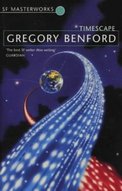
| Publisher: | Millenium |
| Copyright: | 1980 |
| Printing: | 2000 |
| ISBN: | 1-85798-935-X |
| Format: | Trade paperback |
| Pages: | 412 |
There are a lot of scientists in science fiction, but not a lot of science the way that it's actually practiced today. Science fiction has moved away the scientist as can-do engineer model of space opera, where a scientist could build the new superweapon out of the spare parts in their garage and rebuild society from basic materials, but science still tends to show up only as results.
The idea of Timescape is to present a scientific puzzle from the perspective of working scientists, complete with academic politics, struggles for funding, disinterested grad students, personality conflicts, and the incomprehending and sensationalist news media. Set against the background of an ecological disaster in progress, scientists are experimenting with tachyons in the future attempt to pass warnings back to the past. Tachyons can only disrupt a particular type of experiment, however, so they have to try to contact other scientists in the past through patterned disruption of their results. Both threads of the plot therefore focus on practicing scientists, ones from the future in a civilization in decline and no resources desperately trying to get a message through to someone who is trying to measure a physical phenomenon while dealing with unexplained measurement noise.
Unfortunately, the book doesn't hang together very well. I think Benford is trying for a slice-of-life presentation of the lives of scientists, which would explain the amount of extraneous detail and events in the story. It feels realistic, but realistically uninteresting. When the various love life difficulties, personality conflicts, and insecurities don't end up having any noticeable effect on the plot, I have a harder time caring about them. Either the character interactions have to drive the plot along or they have to be interesting enough to hold my attention in their own right. Benford manages neither.
The science does reach a conclusion (and finally a bit of action near the end of the book), but it's an unsatisfying one. Not only do most of the events in the book have little to do with the plot, the actions of the characters end up having minimal effect on the world as well. It's all very pretty from a theory standpoint, and I had a pretty good idea where Benford was going with it about halfway through the book, but there is little emotional payoff in a rather depressing ending.
Benford had a different idea for a story, and throws a few other neat ideas into the mix, but between mostly unlikeable characters, lots of depressing background, and a fizzle ending, I think the best description of Timescape is soulless. It's not badly written, and the portrayal of working scientists makes this fiction about science in the way that very little SF is, but it just didn't hold my interest.
Reviewed: 2005-06-08